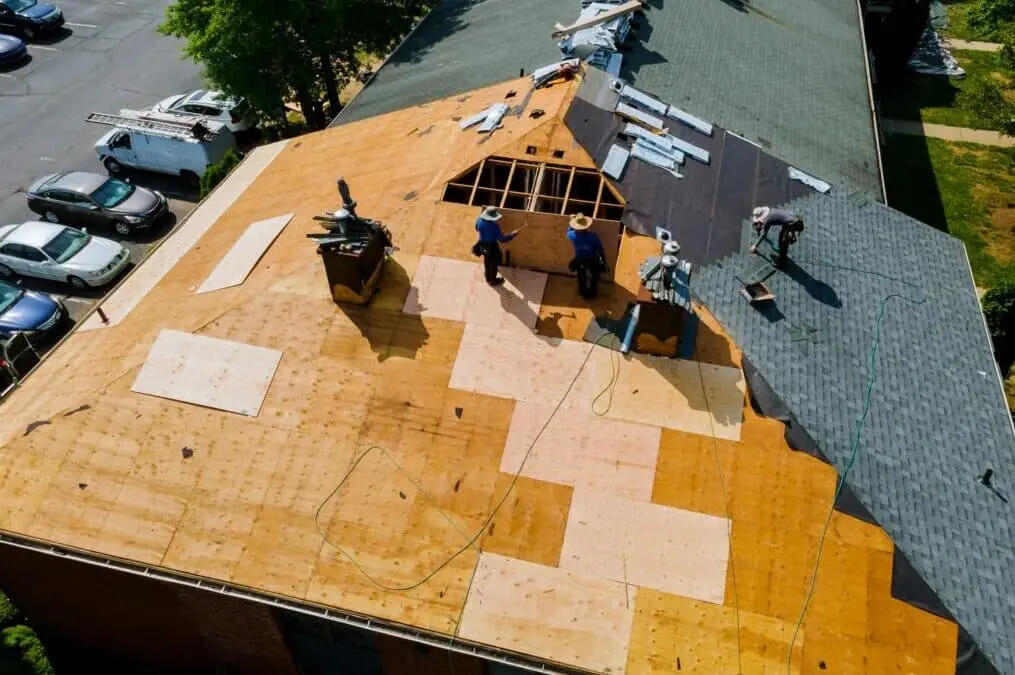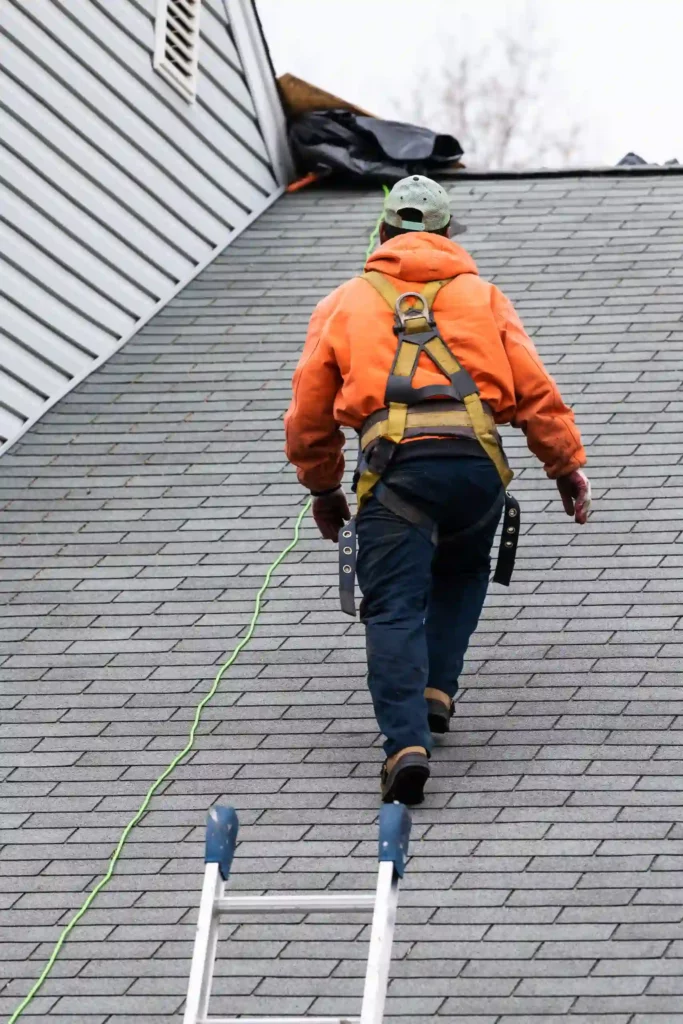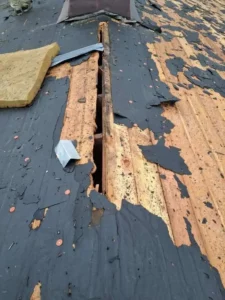Having a well-functioning roof is essential for protecting your home and keeping your family safe and comfortable. However, roofs don’t last forever, and at some point, you’ll need to consider a roof replacement. Planning a roof replacement can be a significant investment, both in terms of time and money, so it’s important to get it right. Unfortunately, there are several common mistakes people make when planning a roof replacement that can end up costing them more in the long run.
In this blog post, we’ll explore four of the most frequent mistakes to avoid when planning a roof replacement for your home. By understanding these potential pitfalls, you can make informed decisions and ensure a successful and cost-effective roofing project.

Table of Contents
ToggleMistake #1: Ignoring the Condition of Your Current Roof
One of the biggest mistakes homeowners make when planning a roof replacement is failing to thoroughly inspect their current roof. It’s essential to have a professional roofer assess the condition of your existing roof before deciding to replace it. They can identify any underlying issues, such as water damage, rot, or structural problems, that may need to be addressed.
Replacing a roof prematurely can be a waste of money, as your current roof may still have several years of life left. On the other hand, waiting too long to replace a deteriorating roof can lead to even more costly roof repairs or even a complete roof failure, which could result in significant damage to your home.
To avoid this mistake, schedule a roof inspection with a reputable roofing contractor. They can provide a comprehensive assessment of your roof’s condition and recommend the best course of action, whether that’s a repair or a full replacement.
Mistake #2: Failing to Research Roofing Materials and Options
Another common mistake when planning a roof replacement is not taking the time to research the different roofing materials and options available. The type of roofing material you choose can have a significant impact on the cost, durability, and overall aesthetic of your home.
Some of the most popular roofing materials include asphalt shingles, metal, tile, and slate. Each material has its own unique advantages and disadvantages, such as lifespan, maintenance requirements, and environmental impact. It’s important to weigh these factors carefully to ensure you select the best option for your home and your budget.
Additionally, you’ll need to consider factors like the pitch of your roof, the climate in your area, and any local building codes or homeowners association (HOA) requirements that may impact your roofing choices.
To avoid this mistake, take the time to educate yourself on the different roofing materials and options available. Consult with your roofing contractor to discuss the pros and cons of each material and how they might fit your specific needs and preferences.
Mistake #3: Underestimating the Costs of a Roof Replacement
Underestimating the costs of a roof replacement is a common mistake that can lead to significant financial headaches down the line. Replacing a roof is a major home improvement project, and the costs can quickly add up, especially if you encounter unexpected issues during the process.
When budgeting for a roof replacement, be sure to consider the following expenses:
- The cost of the roofing materials, including shingles, flashing, and underlayment
- Labor costs for the roofing crew
- Permits and inspections required by your local authorities
- Potential repairs to the roof deck or other structural components
- Disposal fees for the old roofing materials
- Additional costs for specialized work, such as skylights or roof vents
It’s also important to factor in potential contingency costs, as unforeseen issues can arise during the project that may require additional work or materials.
To avoid this mistake, work closely with your roofing contractor to obtain detailed estimates and understand all the potential costs involved. Be sure to get multiple quotes and compare them to ensure you’re getting the best value for your money.
Mistake #4: Failing to Properly Vet and Select a Roofing Contractor
Choosing the right roofing contractor is crucial for the success of your roof replacement project. Unfortunately, many homeowners make the mistake of not thoroughly vetting and selecting a qualified and reputable contractor.
When selecting a roofing contractor, be sure to consider the following:
- License and insurance: Ensure the contractor is licensed and carries the appropriate insurance coverage, including workers’ compensation and liability insurance.
- Experience and references: Look for a contractor with extensive experience in roof replacements, and ask for references from past clients.
- Warranty and guarantees: Inquire about the contractor’s warranty and guarantee policies, as well as the manufacturer’s warranty on the roofing materials.
- Communication and professionalism: Choose a contractor who is responsive, communicative, and professional throughout the process.
Failing to properly vet and select a roofing contractor can lead to subpar workmanship, delays, and even legal issues down the line. It’s worth taking the time to do your research and find a reliable and trustworthy contractor who can ensure a successful roof replacement project.
Conclusion
Planning a roof replacement can be a daunting task, but by avoiding these four common mistakes, you can help ensure a smooth and successful project. Remember to thoroughly inspect your current roof, research your roofing material options, create a realistic budget, and carefully select a qualified roofing contractor.
By taking these steps, you can protect your home, maximize the lifespan of your new roof, and avoid costly mistakes that could end up costing you more in the long run. With the right planning and preparation, your roof replacement project can be a stress-free and rewarding experience.
FAQs About Planning a Roof Replacement
1. How do I know if I need a roof replacement or just repairs?
Determining whether you need a roof replacement or repairs can be challenging. It’s best to consult with a professional roofing contractor who can inspect your roof and provide expert advice based on its condition. Generally, if your roof is older than 20 years, has significant damage, or is experiencing frequent leaks, a replacement may be necessary.
2. What factors should I consider when choosing a roofing material?
When choosing a roofing material, consider factors such as durability, cost, aesthetics, and maintenance requirements. Additionally, think about your home’s architectural style, the climate in your area, and any local regulations that may impact your choice of materials.
3. How long does a roof replacement typically take?
The duration of a roof replacement project can vary depending on the size of your roof, the materials being used, and the weather conditions. On average, a roof replacement can take anywhere from a few days to a week to complete. Your roofing contractor can provide a more accurate timeline based on the specifics of your project.
4. Are there any financing options available for a roof replacement?
Yes, there are various financing options available for roof replacements, including personal loans, home equity loans, and financing plans offered by roofing companies. Be sure to explore different financing options and choose one that fits your budget and financial situation.
5. How can I maintain my new roof to prolong its lifespan?
To prolong the lifespan of your new roof, it’s essential to perform regular maintenance tasks such as cleaning gutters, inspecting for damage after storms, and trimming overhanging branches. Additionally, schedule annual roof inspections with a professional roofer to catch any issues early and prevent costly repairs.
6. What should I do if I encounter problems with my roof replacement after it’s completed?
If you encounter any issues with your new roof after the replacement is completed, contact your roofing contractor immediately. Most reputable contractors offer warranties on their workmanship and can address any problems that arise. Document any issues you notice and communicate them clearly to your contractor for resolution.
7. How can I find a reliable roofing contractor for my roof replacement project?
To find a reliable roofing contractor, ask for recommendations from friends and family, check online reviews, and verify the contractor’s credentials, insurance, and experience. Obtain multiple quotes, ask for references, and ensure clear communication throughout the selection process to find a contractor you can trust.
8. Will a roof replacement increase the value of my home?
A new roof can increase the value of your home by improving its curb appeal, energy efficiency, and structural integrity. Potential buyers often see a new roof as a valuable investment and may be willing to pay more for a home with a recently replaced roof. Additionally, a new roof can help attract buyers and make your home stand out in the real estate market.






